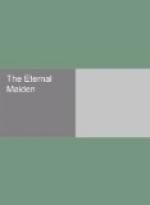“Thy dog is strong,” the girl replied.
“Dost thou love that dotard Attalaq?”
“No,” the maid replied. “He is clumsy as the musk ox.”
They turned, walking toward the igloo occupied by Ahningnetty and her aged father.
“Wilt thou not be Papik’s wife?” Papik pleaded. “My shelter is cold—little meat have I. The white men robbed the tribe. But perchance the bears come—then I shall kill them; valiant is my dog.” He patted the animal’s shaggy head.
“But thy fingers, Papik—Papik! No—no!”
“But Papik loves thee,” he protested; “his skin flushes with the thought of thee.”
“That thou didst also say to Annadoah, whom thou didst seek before me.”
Papik was silent; it was true that Ahningnetty was only a second choice.
At that moment an ominous noise was heard on the sea. The tide, in moving, caused the massive floe-ice to grate against that adhering to the shore. To the simple natives, the noise indicated something more sinister.
“Hearest that?” Ahningnetty asked.
“Yea,” replied Papik, “Qulutaligssuaq, the monster who lives in the sea, cometh with his hammers.”
“He cometh to steal the children. In winter he is very hungry.”
“They say he frightens people to death when a baby which is fatherless screams.”
“And after he heats his ladles, the babies often die.”
Again the grating noise shuddered along the shore, and Ahningnetty, frightened, fled to her house. Papik, pursuing his way, accosted Ootah.
As they were speaking they saw Otaq and his wife emerge from their house. Between them they carried a small stark body. The woman was weeping piteously. It was their child, which a brief while before had died. The sea monster had again claimed its human toll.
Papik and Ootah disappeared—Papik to his shelter, Ootah to Annadoah’s igloo. The parents, left alone, dug up stones and ice and buried the child. Then beneath the stars they stood in silent grief. Other natives, emerging from their houses and seeing them, understood and disappeared, for while relatives weep over their dead none dare disturb their mourning. For five days, in commemoration of the death, the parents would visit the grave of their child, During this time no native dare cross the path leading from their igloo to the silent resting place, and while they stood beneath the stars all alien to their sorrow must remain within their houses. Only the Great Spirit, who lives beyond the golden veils of the boreal lights, may hear the sobbing of a stricken human creature over the thing of which it has been bereft.
In the course of ten sleeps—as days are called—the first moon of the long night sank below the horizon and the colorful stars fierily glittered over a world of black silence. The cold increased to an intolerable bitterness. Ootah, venturing from his igloo to dig up walrus meat, found the earth frozen so solid that it split his steel axe.




